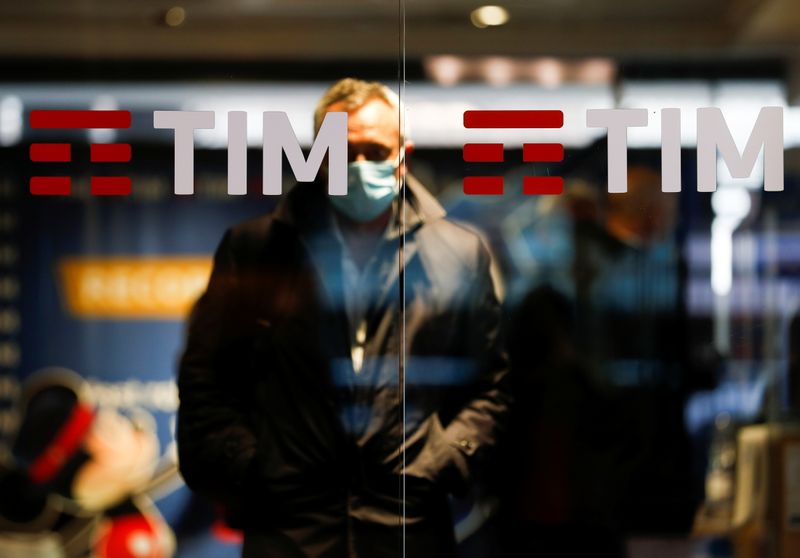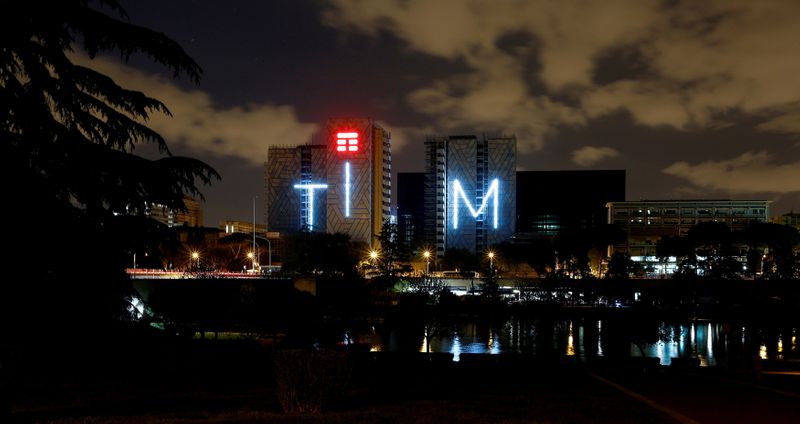By Valentina Za and Elvira Pollina
MILAN (Reuters) -Investors in Telecom Italia (MI:TLIT) on Monday cheered a proposal by U.S. fund KKR to buy Italy's debt-laden former phone monopoly for 33 billion euros ($37 billion) in what would be Europe's biggest ever private equity buyout.
The move comes as a boardroom war rages at Telecom Italia (TIM), which has been mired in crisis for years but is crucial to government efforts to expand broadband connectivity because it owns the country's main network.
KKR's offer, which is conditional on the government's backing and the outcome of a four-week analysis, values TIM at 10.8 billion euros excluding net debt of 22.5 billion - or 45.7% above Friday's closing price for ordinary shares.
The shares were 32% higher in afternoon trade at 0.4585 euros each, versus the offer's "indicative" price of 0.505 euros, with more than 8% of TIM's capital changing hands.
However, yields on TIM's bonds, which on Friday S&P cut further below the investment grade, spiked higher, with investors fretting about a possible further increase in debt.
Successive deals have inflated TIM's debt to a gross 30.5 billion euros, crippling a company that was a crown jewel of government assets before its ill-fated 1997 privatisation.
Private equity-backed M&A deals have reached $1 trillion globally in 2021, 53% above the all-time yearly record of $663 billion of 2007, Refinitiv data show.
KKR's offer, which the New York-based fund has described to TIM as "friendly", would expose the company's top investor Vivendi (OTC:VIVHY) to a steep loss on its 24% stake, for which it spent on average 1.07 euros per share.
A person close to the French media group said Vivendi believed KKR's offer did not adequately value TIM. KKR is targetting a 51% acceptance threshold so the offer does not need Vivendi's backing.
TIM's board did not give a view on the proposal.
Vivendi has been pushing to replace TIM CEO Luigi Gubitosi, who has failed to stem a revenue haemorrhage, leading to two profit warnings in three months and an almost 40% fall in the group's market value during his three-year tenure.
Italy has special powers to block foreign bids for strategic assets, and it has said it would decide whether to use them depending on plans for TIM's fixed line business.
"The path towards a formal offer may not be certain, nor fast - but we think the offer is articulate and credible," HSBC said.
BROADBAND ROLLOUT
As well as protecting the jobs of 42,500 local staff, Rome wants to ensure plans for the network are in line with efforts to deploy billions of euros of European Union recovery funds to rollout ultra-fast broadband across Italy - an EU digital connectivity laggard.
KKR wants to take TIM private, which analysts say would make a restructuring easier. Its offer targets both ordinary and savings shares.
"An experienced private capital provider such as KKR might prove a better fit to support TIM's turnaround," UBS said.
KKR, which is working with Citi, JPMorgan (NYSE:JPM) and Morgan Stanley (NYSE:MS) on the deal, has a long track record in the sector.
In April, it set up wholesale fibre firm Open Dutch Fiber, while in 2020 it acquired with rivals Cinven and Providence Spain's fourth-largest phone group MasMovil.
KKR would carve out TIM's fixed-line business to be run as a government-regulated asset along the model of power grid Terna or gas grid Snam, sources have said.
KKR already holds a 37.5% stake in FiberCop, the unit holding TIM's last-mile network running from the street to people's homes.
Gubitosi has been trying to revive a project to merge TIM's network assets with those of rival Open Fiber, a competitor in which state investor CDP is set to gain control. CDP is also the second-biggest investor in TIM, with a 10% stake.

The single network plan has run aground under Prime Minister Mario Draghi, though a source close to the matter said the Treasury was still studying a possible merger of TIM's fixed network with Open Fiber's under CDP's control.
($1 = 0.8872 euros)
